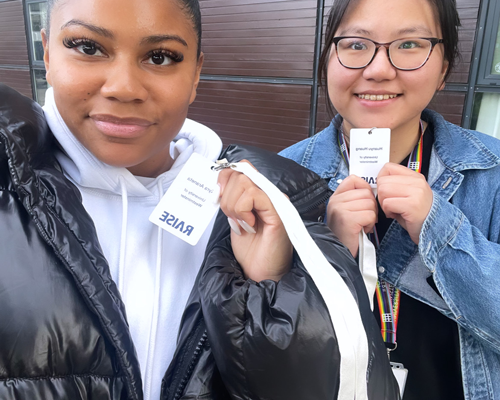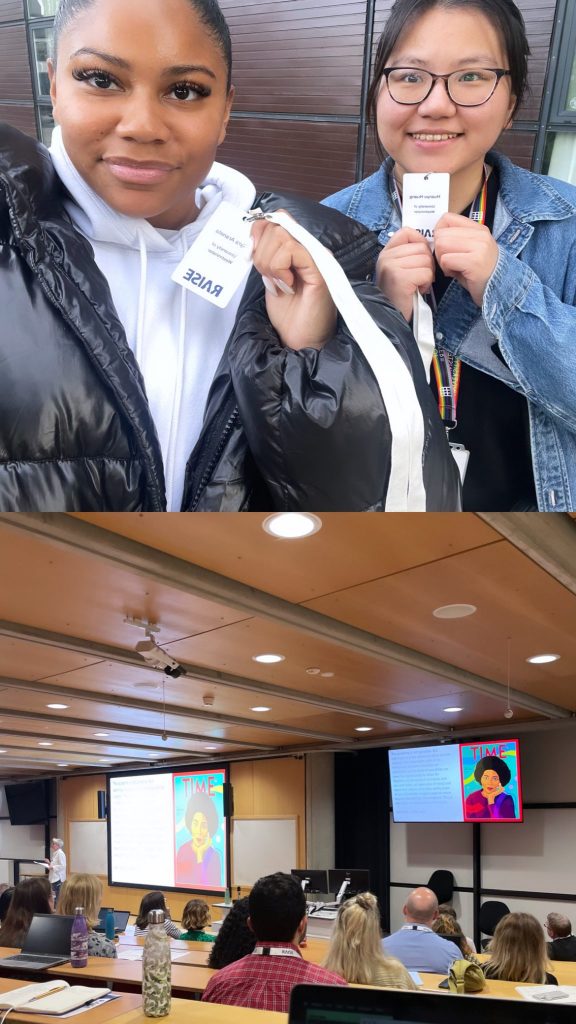Kyra
Towards the end of the summer, myself and Huanyu got to attend the 2022 RAISE conference held at the University of Lincoln. The two-day conference was an opportunity for students, lecturers and academic staff to come together to reflect on the origins and impact of Student as Producer practice and hear about the project and programs going on in the field. One of my favourite keynotes was “Empowering Non-Traditional Learners Through Creative Methodologies” given by Fatema Khatun, Josh Evans and Gary Poynton, from Birmingham City University. For them, “non-traditional” students refers to first generation, BAME, mature, and disabled students etc in order to draw attention to the history of an institution that was not made to educate people that were not white, male, ethnic, old or able-bodied. The speakers noted how non-traditional students remain concentrated in post-92 universities and as a student within this category and based at the University of Westminster, I was intrigued to find out about the creative methodologies they found useful. They mentioned methods such as: memetic learning for learners with SEND; walking interviews for non-traditional learners; and setting up “listening rooms” inspired by Heron (2019) for BAME learners.
Another session I found stimulating was held by Leah Henrickson and Gemma Wood from the University of Leeds. They organised a mindful dotting exercise, which I hadn’t heard of before, but it proved to be really fun and got everyone room in conversation with each other — which was the aim! They mentioned that they often use this exercise with their undergraduate students to help them feel connected to those involved and since it doesn’t require any artistic skill, it is something that can be enjoyed by almost anyone.
Overall, I found the conference deeply engaging and I left equipped with a wide range of ideas to take back to my own partnership project!
Huanyu
From 7th to 8th September, Kyra and I attended the 2022 RAISE conference in Lincoln, which was the first RAISE Conference to be held offline since the COVID-19 pandemic. The conference has two parts. Every morning started with a keynote presentation, which was presented by the main guests. Subsequently, the participants dispersed in various simultaneous sessions. These sessions ranged from presentations of academic papers to workshops oriented toward practical interaction.
From my personal experience, the RAISE 2022 was a very fulfilling, informative, and meaningful conference. Two parts impressed me the most.
The first specific one is the paper presentation by Ashely Storer-Smith from the University of Winchester, who introduced his research regarding student activism transformation at universities in the US and UK. What I find interesting about this presentation is that this research topic combines issues of higher education and social movement. Showing the evolution of student movements in universities in the past decade, the researcher provides a
unique perspective on social movement studies. For student movements happening in universities, the online campaign is seen as a safer way than offline protest, thus widely used by students, and become the motivation to push student campaigns to transform from offline to online. This is a different perspective from the usual studies focusing on the mobilisation and functionality of online platforms in social movements. It has also broadened my research perspective.
The second part that impresses me is the composition of the various sessions of this conference. Unlike the traditional conference, which mainly combines presentation and seminar, this RAISE conference also provided workshops on various topics, increasing interactivity and making people think more about the possibility of better practicality and student engagement under the idea of ” Student as Producer”.
I am very grateful for this opportunity to have a different experience from traditional academic conferences. The student-led, teacher-student interacting atmosphere in the RAISE conference is, in my opinion, a great practice of “Student as Partnership”, which is also very helpful for me to think about how to combine my research perspective better with the future SaP work.
- Students as Partners conference at Wilfrid Laurier University - 23 September 2024
- Students as Partners conference at Wilfrid Laurier University - 23 September 2024
- RAISE conference at University of Lincoln - 23 September 2024

